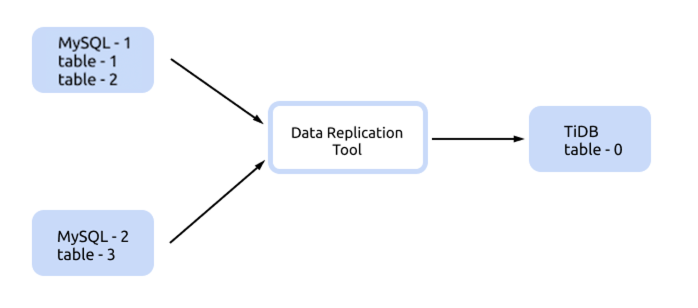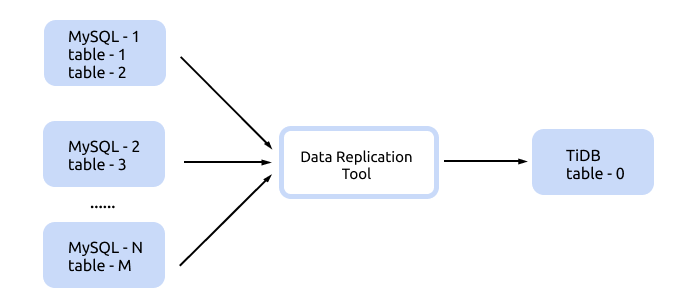Data Check in the Sharding Scenario
sync-diff-inspector supports data check in the sharding scenario. Assume that you use the TiDB Data Migration tool to replicate data from multiple MySQL instances into TiDB, you can use sync-diff-inspector to check upstream and downstream data.
For scenarios where the number of upstream sharded tables is small and the naming rules of sharded tables do not have a pattern as shown below, you can use Datasource config to configure table-0, set corresponding rules and configure the tables that have the mapping relationship between the upstream and downstream databases. This configuration method requires setting all sharded tables.

Below is a complete example of the sync-diff-inspector configuration.
# Diff Configuration.
######################### Global config #########################
# The number of goroutines created to check data. The number of connections between upstream and downstream databases are slightly greater than this value
check-thread-count = 4
# If enabled, SQL statements is exported to fix inconsistent tables
export-fix-sql = true
# Only compares the table structure instead of the data
check-struct-only = false
######################### Datasource config #########################
[data-sources.mysql1]
host = "127.0.0.1"
port = 3306
user = "root"
password = ""
route-rules = ["rule1"]
[data-sources.mysql2]
host = "127.0.0.1"
port = 3306
user = "root"
password = ""
route-rules = ["rule2"]
[data-sources.tidb0]
host = "127.0.0.1"
port = 4000
user = "root"
password = ""
########################### Routes ###########################
[routes.rule1]
schema-pattern = "test" # Matches the schema name of the data source. Supports the wildcards "*" and "?"
table-pattern = "table-[1-2]" # Matches the table name of the data source. Supports the wildcards "*" and "?"
target-schema = "test" # The name of the schema in the target database
target-table = "table-0" # The name of the target table
[routes.rule2]
schema-pattern = "test" # Matches the schema name of the data source. Supports the wildcards "*" and "?"
table-pattern = "table-3" # Matches the table name of the data source. Supports the wildcards "*" and "?"
target-schema = "test" # The name of the schema in the target database
target-table = "table-0" # The name of the target table
######################### Task config #########################
[task]
output-dir = "./output"
source-instances = ["mysql1", "mysql2"]
target-instance = "tidb0"
# The tables of downstream databases to be compared. Each table needs to contain the schema name and the table name, separated by '.'
target-check-tables = ["test.table-0"]
You can use table-rules for configuration when there are a large number of upstream sharded tables and the naming rules of all sharded tables have a pattern, as shown below:

Below is a complete example of the sync-diff-inspector configuration.
# Diff Configuration.
######################### Global config #########################
# The number of goroutines created to check data. The number of connections between upstream and downstream databases are slightly greater than this value.
check-thread-count = 4
# If enabled, SQL statements is exported to fix inconsistent tables.
export-fix-sql = true
# Only compares the table structure instead of the data.
check-struct-only = false
######################### Datasource config #########################
[data-sources.mysql1]
host = "127.0.0.1"
port = 3306
user = "root"
password = ""
[data-sources.mysql2]
host = "127.0.0.1"
port = 3306
user = "root"
password = ""
[data-sources.tidb0]
host = "127.0.0.1"
port = 4000
user = "root"
password = ""
########################### Routes ###########################
[routes.rule1]
schema-pattern = "test" # Matches the schema name of the data source. Supports the wildcards "*" and "?"
table-pattern = "table-*" # Matches the table name of the data source. Supports the wildcards "*" and "?"
target-schema = "test" # The name of the schema in the target database
target-table = "table-0" # The name of the target table
######################### Task config #########################
[task]
output-dir = "./output"
source-instances = ["mysql1", "mysql2"]
target-instance = "tidb0"
# The tables of downstream databases to be compared. Each table needs to contain the schema name and the table name, separated by '.'
target-check-tables = ["test.table-0"]
Note
If test.table-0 exists in the upstream database, the downstream database also compares this table.